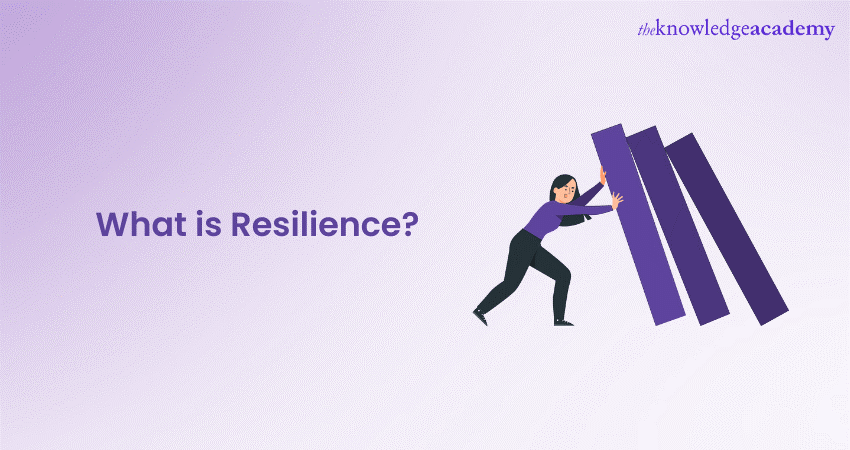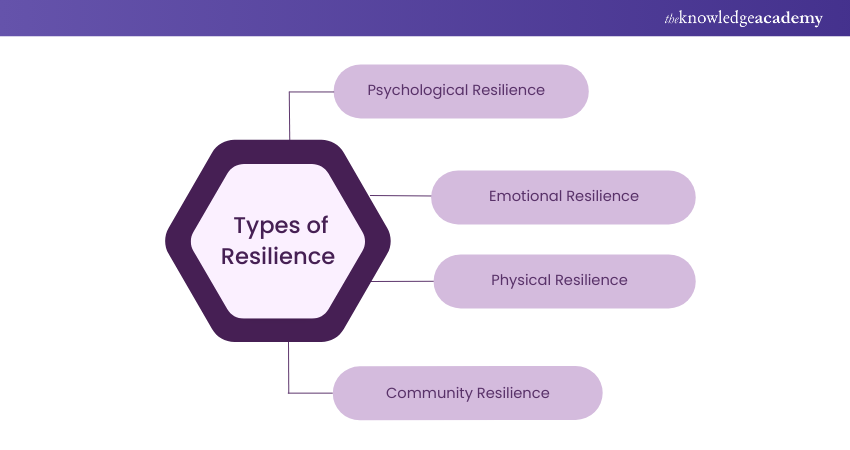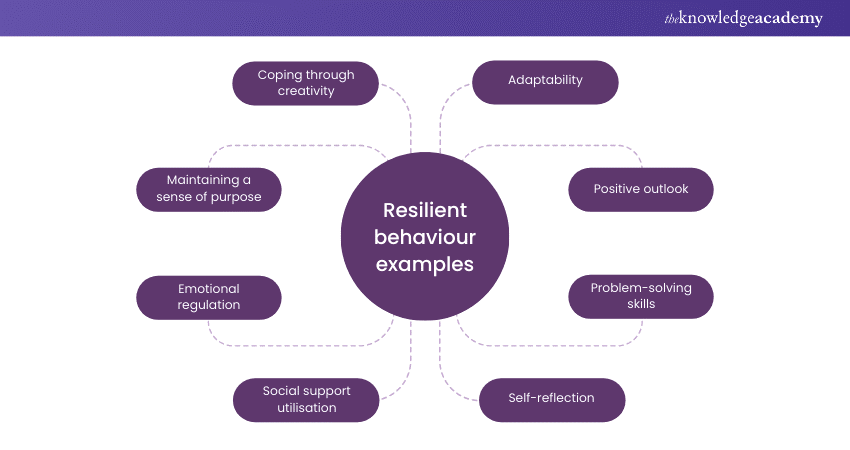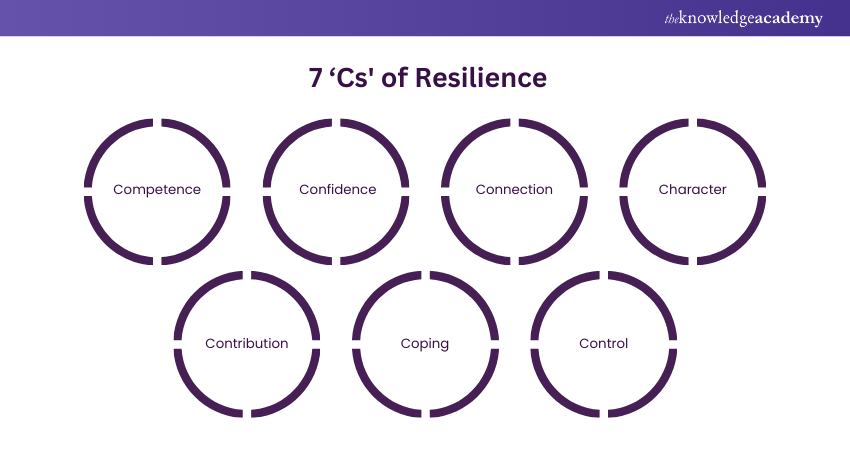We may not have the course you’re looking for. If you enquire or give us a call on +44 1344 203 999 and speak to our training experts, we may still be able to help with your training requirements.
We ensure quality, budget-alignment, and timely delivery by our expert instructors.

What is Resilience? Sometimes it’s the fabric people don’t see but serves as the protective armor to help hold us together when life tries to tear us apart. Whether it is getting back on our own two feet after personal disasters, struggling to overcome professional obstacles or coming together as communities after disastrous events; Resilience is the ability of endurance and meaningful growth. Not only is it important to just exist through the storms but to also grow and prosper due to them.
Thus, what does Resilience look like? Here it is we are talking about the Resilience of the student when he or she fails, about the Resilience of the team when they meet an obstacle they never anticipated and about the Resilience of the community when a crisis occurs.
Resilience is fought with by every human and applying emotional strength, mental turning and the true strength of unity. We utilise it to turn the adversities of life into the key that unlocks opportunities to achieve success.
Table of Contents
1) What is Resilience?
2) Importance of Resilience
3) Types of Resilience
4) 6 Signs of Resilience in Life
5) Various Examples of Resilient Behaviours
6) What are the 7 ‘Cs’ of Resilience
7) Does Gender Affect Resilience
8) Steps to Build Resilience
9) Top 10 Resilience Skills
10) How Do I Train Myself to Be More Resilient?
11) Conclusion
What is Resilience?
Resilience is the capacity to get back swiftly from challenges, barriers, or major life changes while maintaining mental health and well-being. It involves not only surviving but also flourishing in the face of adversity. Resilient individuals, much like the concept of Resilient Distributed Datasets, exhibit emotional strength, mental stamina, and a positive outlook, which enables them to effectively navigate life's ups and downs.
Emotional regulation skills, self-awareness, and the ability to maintain a balanced perspective are all important components of Resilience, frequently explored through Resilience Interview Questions. Resilience enables people to face challenges with courage and confidence by developing healthy coping mechanisms, strong social support systems, and an open-minded attitude toward change.
Importance of Resilience
The importance of Resilience cannot be overstated; it is the key to navigating challenges and emerging stronger, no matter the circumstances. The following points highlight the importance of resilience:
a) Navigating Challenges: Empowers people to face and overcome obstacles, setbacks, and uncertainty with strength and adaptability.
b) Mental Well-being: Promotes emotional stability and continuous motivation.
c) Workplace Stress: Prepares people to deal with workplace stress and adapt to changing conditions.
d) Positive Mindset: Promotes positive thinking, problem-solving, and determination.
e) Community Strength: Helps communities to weather crises more effectively, demonstrating collective strength.
f) Self-efficacy: Nurtures a sense of self-efficacy and confidence in personal development.
g) Proactive Attitude: Encourages a proactive and optimistic attitude towards life's challenges.
h) Transformative Power: Shapes individuals and communities to not only endure hardships but also emerge stronger and more resourceful.
i) Future Preparedness: Better equips individuals and communities for future challenges.
Unlock your peak productivity with Attention Management Training - sharpen your focus and supercharge your success!
Types of Resilience
Resilience, a multidimensional trait, manifests in various forms, each addressing different aspects of an individual's or community's ability to adapt, overcome challenges, and thrive in the face of adversity. Let's delve into the four key types of Resilience.

Psychological Resilience
a) Psychological Resilience simply means the ability to stand up face, manage and overcome life challenges.
b) It encompasses learning to develop Resilience, meaning making, and construction of successive ways of overcoming difficulties.
c) Having high psychological capital means a person learns how to cope with stress, trauma, or an extraordinary event.
d) They include problem solving, self-awareness and personal growth.
e) Cognitive behavior therapy, mindfulness, and constructing social support systems are all part of RESILIENCE.
f) Psychological Resilience is the ability of people to assertively approach and address all tasks and goals that come their way.
Emotional Resilience
a) Emotional Resilience is the ability to manage and recover from emotional challenges.
b) It involves recognising, understanding, and navigating one’s own emotions effectively.
c) Includes the capacity to empathise with others’ emotions.
d) Emotionally resilient individuals maintain balance during setbacks, disappointments, and conflicts.
e) Acknowledging and regulating emotions builds the strength to handle emotional complexities.
f) Emotional Resilience supports overall well-being amidst life’s challenges.
Physical Resilience
a) Physical Resilience is the body’s ability to endure and recover from physical challenges, illnesses, or injuries.
b) It focuses on maintaining overall health, strength, and vitality.
c) Key contributors to physical Resilience include Regular exercise, a balanced diet, adequate rest, and healthy lifestyle choices.
d) Strengthening physical Resilience enhances the ability to withstand health challenges.
e) Physical Resilience promotes overall well-being and vitality.
Community Resilience
a) Community Resilience focuses on a community's ability to withstand and recover from adversities, disasters, or disruptions.
b) It emphasises effective collaboration, communication, and resource utilisation within the community.
c) Key factors influencing community Resilience include social cohesion, disaster preparedness, and supportive community structures.
d) Community Resilience requires active community engagement, inclusive decision-making, fostering a sense of unity and shared responsibility.
Enhance your Emotional Intelligence skills with our Emotional Intelligence Training and excel!
6 Signs of Resilience in Life
Resilience research recognises each of the following as both facilitators and indicators of Resilience in individuals:
a) Reframing: Stress can be managed or relieved to some extent by imagining a different, and perhaps more beneficial, manner of perceiving the problem or situation at hand.
b) Using the Power of Positive Emotions: Tense feelings such as these expand our horizons and help him to consider less obvious strategies for navigating more effective solutions to problems. They can also enhance our reliability, allow us to connect with pro-social people and groups as well as increase feelings of competence and concepts of pride.
c) Participating in Physical Activities: Stress can be managed and the effects minimised by increasing physical activity, in addition confidence and self-esteem is boosted.
d) Ongoing Active Engagement in Trusted Social Networks: As we lean on friends, workmates and family members we feel less alone and are able to have the right attitude concerning what is going on.
e) Identifying and Using Signature Strengths: It is when we use the strengths and align with who we are, we feel more purposeful and in charge especially in developing new tasks or overcoming rough weather.
f) Optimism Regarding the Future: One way is to learn to look at the future with positive expectations, which makes one see that most of the problems faced are actually fleeting and can easily be dealt with by making one feel more positive about the future.
Various Examples of Resilient Behaviours
Resilient behaviours encompass a range of responses and coping strategies that individuals exhibit in the face of adversity. These behaviours enable individuals to navigate challenges and contribute to personal growth and emotional well-being. Here are various examples of resilient behaviours:

a) Adaptability: Resilient individuals demonstrate high adaptability, embracing change and adjusting their mindset to navigate new circumstances. They view challenges as opportunities for learning and growth, fostering flexibility in their approach to life's uncertainties.
b) Positive Outlook: Maintaining a positive outlook in challenging situations is a hallmark of Resilience. Resilient individuals focus on solutions rather than dwelling on problems, cultivating optimism that acts as a driving force to overcome setbacks and persevere through difficulties.
c) Problem-solving Skills: Resilience involves effective problem-solving. Individuals with resilient behaviours approach challenges analytically, breaking down complex issues into manageable components. This proactive problem-solving mindset enables them to find solutions and take constructive action.
d) Self-reflection: Resilient individuals self-reflect, gaining insight into their emotions, thoughts, and behaviours. This reflective practice enhances self-awareness, allowing them to understand their reactions to adversity better and positively adjust their coping strategies.
e) Social Support Utilisation: Seeking and leveraging social support is a resilient behaviour. Resilient individuals recognise the importance of connections and actively seek support from friends, family, or community networks. Building and maintaining strong social ties contribute significantly to emotional well-being during challenging times.
f) Emotional Regulation: Resilient individuals exhibit effective emotional regulation, acknowledging and managing their emotions constructively. They avoid being overwhelmed by negative emotions, employing strategies like mindfulness, deep breathing, or other relaxation techniques to maintain emotional balance.
g) Maintaining a Sense of Purpose: Resilient behaviours often involve maintaining a sense of purpose and direction in life. This overarching goal provides motivation and Resilience during challenging times, serving as a guiding force that helps individuals navigate difficulties with determination and focus.
h) Coping Through Creativity: Creativity is a powerful form of Resilience. Engaging in creative pursuits, such as art, writing, or music, allows individuals to express emotions, find solace, and channel their energy into constructive outlets during challenging periods.
Unlock your full potential with our Personal Development Training and become the best version of yourself today.
What Are the 7 ‘Cs' of Resilience?
The 7 'Cs' of Resilience are a framework designed to help individuals, especially young people, develop Resilience. This concept was developed by Dr. Kenneth Ginsburg, a Paediatrician specialising in adolescent medicine. The 7 'Cs' include:

a) Competence: The foundation of Resilience is the development of a varied set of skills, which equips an individual to tackle life’s challenges confidently. This process is an ongoing one, marked by continual learning and self-enhancement.
Embracing a growth-oriented mindset and proactively pursuing developmental opportunities can significantly boost Resilience. Participating in activities that stretch one’s limits and demand creative thinking enhances flexibility and bolsters the ability to bounce back from difficulties.
b) Confidence: Confidence is a pivotal element of Resilience, rooted in the conviction of one’s capabilities and the assurance that one can overcome hurdles. It involves recognising and valuing one’s accomplishments, identifying personal strengths, and viewing challenges as opportunities for growth.
By establishing realistic objectives, celebrating progressive successes, and nurturing a constructive self-perception, Resilience is reinforced. This enables one to face challenges with determination.
c) Connection: The significance of connections in Resilience cannot be overstated. Being surrounded by a network of supportive individuals—be it friends, family, mentors, or support groups—provides a sense of community, empathy, and mutual understanding, particularly during difficult periods.
Cultivating these relationships not only offers emotional support but also introduces a variety of perspectives and coping strategies. Seeking assistance and nurturing healthy connections are vital in enhancing and maintaining Resilience.
d) Character: A resilient individual’s character is anchored in a foundation of ethical principles and integrity. It serves as a guiding beacon for making decisions and taking action, particularly when faced with challenges. Embracing virtues like honesty, empathy, and persistence helps sustain Resilience and allows one to handle tough situations with poise and honour.
Cultivating a strong character requires self-reflection and a deep understanding of personal values. It also demands a commitment to act in alignment with those values, regardless of the obstacles encountered.
e) Contribution: The quest for purpose and the desire to make a meaningful contribution to the world are powerful drivers of Resilience. Involvement in activities that have a positive impact on others—such as community service, aiding those in need, or following a passion—strengthens Resilience. These activities provide a sense of purpose and satisfaction. Concentrating on positive contributions can renew one’s strength and determination to surmount life’s hurdles.
f) Coping: Effective coping strategies are indispensable for Resilience, enabling one to manage stress and adversity successfully. The development of sound coping techniques involves recognising and practising methods that support emotional health and mental fortitude. This includes physical exercise, mindfulness, writing, professional counselling, or enjoyable pastimes that offer tranquillity and pleasure.
g) Control: Resilience involves acknowledging what is within one’s sphere of influence and releasing concerns over what cannot be changed. Concentrating on the elements that one can control enhances the ability to respond proactively. Taking command of the manageable facets of a situation directs one’s energy and resources towards crafting solutions.
It’s about shifting one’s mindset, modifying behaviours, and exploring alternatives when confronted with challenges. By accepting ownership over personal choices, responses, and decisions, one bolsters Resilience and lays a firm groundwork to tackle adversity with confidence.
Achieve your dreams with our Motivation and Goal Setting Training – register now and succeed!
Does Gender Affect Resilience?
Research exploring the relationship between Resilience and gender reveals that men and women may exhibit different responses to adversity and trauma, though findings have been mixed.
Resilience in Women
Women have historically demonstrated greater survival rates during crises, often outliving men. Despite this, they are more prone to developing PTSD after traumatic events, which may be linked to distinct coping styles.
In facing societal challenges such as job discrimination and violence, women’s resilience manifests through the adoption of traditionally masculine traits, seeking mentorship, and relying on internal motivation.
Resilience in Men
Resilience in men acts as a safeguard against mental health issues like depression and anxiety. Research suggests that men with lower resilience may suffer from severe depression following the loss of a spouse, while those with higher resilience levels maintain their mental health comparably to married men.
Black American men, in particular, find resilience through hobbies, family support, and religious practices.
Achieve your goals with our Strategic Planning and Thinking Course - sign up today!
Steps to Build Resilience
Building Resilience is a proactive and ongoing process that involves adopting a mindset, developing coping strategies, and cultivating a support network. Here are key steps to strengthen Resilience:
a) Cultivate a Positive Mindset: Embrace challenges as opportunities for growth rather than insurmountable obstacles. A positive mindset fosters Resilience by reframing setbacks such as learning experiences and promoting adaptability.
b) Develop Self-awareness: Understand your strengths, weaknesses, and emotional triggers. Self-awareness enables you to navigate challenges more effectively by recognising how you typically respond to stress and adversity.
c) Build Healthy Relationships: Cultivate strong social connections with friends, family, and colleagues. Building a support network provides a sense of belonging, emotional support, and a safety net during challenging times.
d) Foster Problem-solving Skills: Develop effective problem-solving skills to address challenges systematically. Breaking down problems into manageable steps and focusing on solutions enhances your ability to overcome obstacles.
e) Practice Mindfulness and Stress Reduction Techniques: Engage in mindfulness practices, meditation, or deep-breathing exercises to manage stress. These techniques promote emotional regulation and provide a sense of calm during difficult situations.
f) Maintain Physical Well-being: Prioritise physical health through regular exercise, a balanced diet, and sufficient sleep. Physical well-being contributes to overall Resilience by enhancing energy levels and mental clarity.
g) Set Realistic Goals: Establish achievable goals that align with your values. Setting realistic goals helps create a sense of purpose and accomplishment, boosting confidence and Resilience.
h) Seek Professional Support: If facing persistent challenges, consider seeking guidance from mental health professionals. Therapy or counselling can provide valuable tools for coping with stressors and building emotional Resilience.
i) Adaptability and Flexibility: Embrace adaptability and flexibility in your approach to life. Being open to change and willing to adjust plans fosters Resilience in unexpected developments.
j) Learn from Experiences: Reflect on past experiences and challenges. Extract lessons from successes and setbacks, applying that wisdom to future situations.
Top 10 Resilience Skills
Resilience is not merely an inherent trait; it's a set of skills that can be cultivated and honed over time. These skills empower individuals to navigate challenges, bounce back from setbacks, and thrive amidst adversity. Here are the top eight Resilience skills that contribute to building a robust and adaptable mindset:
a) Positive Thinking: Cultivating a positive mindset is foundational to Resilience. It involves reframing challenges as opportunities, maintaining optimism, and focusing on solutions rather than problems. Positive thinking enables individuals to approach setbacks with a constructive outlook.
b) Emotional Regulation: Emotionally resilient individuals possess the skill of recognising, understanding, and regulating their emotions effectively. This involves managing stress, coping with disappointment, and maintaining emotional balance during challenging situations.
c) Adaptability: The ability to adapt to change is a crucial Resilience skill. Adaptability means embracing flexibility, adjusting to new circumstances, and finding creative solutions to unforeseen challenges. It allows individuals to thrive in dynamic and uncertain environments.
d) Problem-solving: Resilient individuals excel at problem-solving. They approach challenges proactively, break down complex issues into manageable components, and develop effective strategies to overcome obstacles. Problem-solving skills contribute to a sense of control and agency.
e) Self-compassion: Practicing self-compassion involves treating oneself with kindness and understanding, especially in the face of failure or setbacks. Resilient individuals acknowledge their humanity, learn from mistakes, and avoid harsh self-criticism.
f) Social Connection: Building and maintaining strong social connections is a Resilience skill that involves seeking support from friends, family, and community. Social bonds provide emotional sustenance, encouragement, and belonging during challenging times.
g) Mindfulness and Relaxation: Resilient individuals often use mindfulness practices and relaxation techniques to manage stress and enhance mental well-being. Mindfulness fosters present-moment awareness, reducing anxiety about the future and regret about the past.
h) Goal Setting: Setting realistic and achievable goals is a Resilience skill that provides individuals with a sense of purpose and direction. Goal setting helps break down larger challenges into manageable steps, allowing for a gradual and successful approach to overcoming obstacles.
i) Effective Communication: Effective communication means clearly and assertively expressing your needs and feelings while also actively listening to others.
j) Effective Copying Strategies: Adopting effective coping strategies involves using healthy mechanisms such as positive self-talk, visualisation, exercise, goal setting, social support, mindfulness, and relaxation techniques.
Unlock peace of mind and boost productivity with our Stress Management Training – join us today to regain control over your life!
How to Train Myself to be More Resilient?
It is the ability that makes people get ready and better for unearthing new ways of changing thinking and invoking strength for overcoming challenges. In the context of Unreal Engine 4 Vs 5, the following steps may help you build resilience over time:
a) Develop Self-awareness: Knowing how one reacts under stress and during adversity is the first process of learning healthier coping styles. Another aspect of self-awareness is understanding strengths, and, vice versa, knowing weaknesses.
b) Build Self-regulation Skills: It means to stay on course is paramount and yet, always a challenge in stressful conditions. There are several relaxation methods including visualisation, slow deep breathing and training in mindfulness that can be used to self soothe and thus manage emotions, thoughts and behaviors.
c) Learn Coping Skills: This means that there are diverse ways in which one can manage stress and effectively tackle difficult circumstances. These are: writing in a diary, changing one’s way of thinking, exercising, going outside, getting social, getting better sleep, and turning to imagination.
d) Increase Optimism: Optimists usually have a feeling that they can handle their destiny. Selectively devote your time to thinking about the workable solution that you can take when facing a difficulty in order to learn optimism.
e) Strengthen Connections: Resilience can be supported by various systems. Support the existing social networks and seek chances for network enhancement.
f) Know Your Strengths: As individuals are more capable when they are able to point out what they can do well, then such individuals will feel more confident when they are in a position to point out their ability.
Conclusion
Understanding What is Resilience is key to thriving amidst life's challenges. By exploring its importance, types, and practical strategies and recognising gender influences, you can build Resilience. This newfound strength, positivity, and adaptability will empower you to face adversity with confidence and grace.
Unlock your inner strength and Resilience - Join our transformative Resilience Training today!
Frequently Asked Questions
Who is a Resilient Person?

Life Resilience on the other hand refers to a person’s ability to cope with life stresses, bounce back from adversity and achieve personal success during and after the stress. Responsibility is demonstrated by emotional strength, positive mindset and problem-solving abilities.
What are the 5 Cs of Resilience?

The 5 Cs of Resilience are:
a) Confidence
b) Connection
c) Character
d) Competence
e) Contribution
What are the Other Resources and Offers provided by The Knowledge Academy?

The Knowledge Academy takes global learning to new heights, offering over 3,000 online courses across 490+ locations in 190+ countries. This expansive reach ensures accessibility and convenience for learners worldwide.
Alongside our diverse Online Course Catalogue, encompassing 19 major categories, we go the extra mile by providing a plethora of free educational Online Resources like News updates, Blogs, videos, webinars, and interview questions. Tailoring learning experiences further, professionals can maximise value with customisable Course Bundles of TKA.
What is The Knowledge Pass, and How Does it Work?

The Knowledge Academy’s Knowledge Pass, a prepaid voucher, adds another layer of flexibility, allowing course bookings over a 12-month period. Join us on a journey where education knows no bounds.
What are the Related Courses and Blogs Provided by The Knowledge Academy?

The Knowledge Academy offers various Personal Development Courses, including Resilience Training, Stress Management Course, Building Business Relationships and Motivation and Goal Setting Training. These courses cater to different skill levels, providing comprehensive insights into Anger Management Strategies.
Our Business Skills Blogs cover a range of topics related to Resilience, offering valuable resources, best practices, and industry insights. Whether you are a beginner or looking to advance your Personal Development skills, The Knowledge Academy's diverse courses and informative blogs have got you covered.
Upcoming Business Skills Resources Batches & Dates
Date
 Resilience Training
Resilience Training
Fri 28th Feb 2025
Fri 4th Apr 2025
Fri 27th Jun 2025
Fri 29th Aug 2025
Fri 24th Oct 2025
Fri 5th Dec 2025






 Top Rated Course
Top Rated Course



 If you wish to make any changes to your course, please
If you wish to make any changes to your course, please


